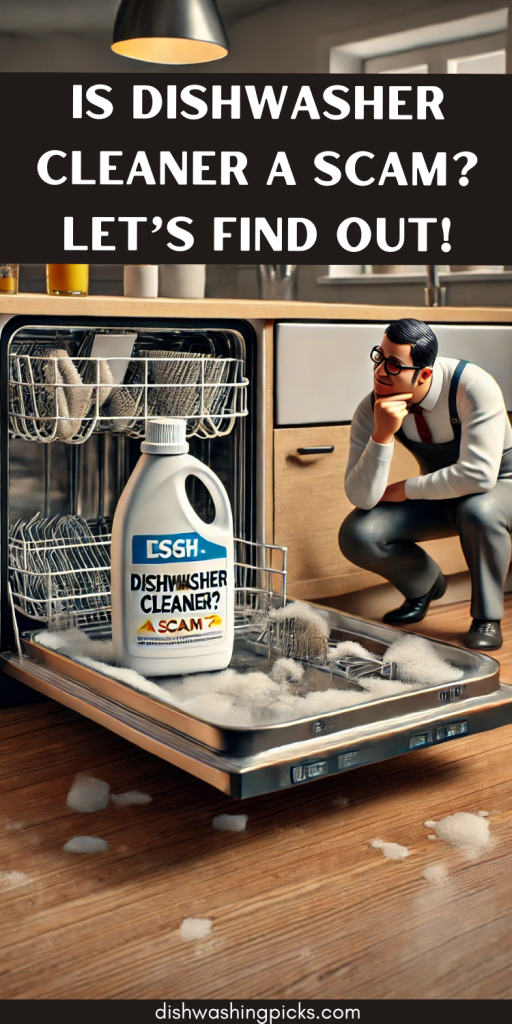
You know that feeling when you buy something, use it, and then immediately wonder, Wait… did that actually do anything? Yeah, that’s pretty much the universal reaction to dishwasher cleaners. Are they miracle workers, or just another way for companies to make us spend more money? Let’s dig in and separate fact from fiction.
Why Do You Even Need a Dishwasher Cleaner?
Think about it—your dishwasher’s whole job is to clean things. So why would it need cleaning itself? Sounds kind of like washing soap, right? Well, not exactly. Over time, dishwashers collect grease, food particles, limescale, and even mold (yes, gross!). That buildup can mess with performance, leading to cloudy glasses, funky smells, and a machine that’s working harder than it should. But here’s the big question: does a dishwasher cleaner actually fix that, or is it just a fancy bottle of scented water?
How Do Dishwasher Cleaners Claim to Work?
If you’ve ever read the label on one of these cleaners (which, let’s be honest, most of us don’t), you’ll see a bunch of promises:
✅ Removes grease and limescale
✅ Eliminates odors
✅ Improves dishwasher performance
✅ Leaves your machine sparkling clean
Sounds pretty convincing, right? But here’s the real question: Do these cleaners actually do anything that your dishwasher’s hot water and detergent don’t already handle?
Well, most commercial dishwasher cleaners contain a mix of citric acid, surfactants (fancy soap), and sometimes bleach. The idea is that these ingredients break down the gunk that builds up inside your machine over time.
But wait—doesn’t your dishwasher already use detergent and hot water? Why would it need extra cleaning? This is where things get interesting.
The Science Behind Dishwasher Buildup
Here’s the deal: While your dishwasher does a solid job of blasting off food and grease from your plates, it doesn’t always do the same for itself. Over time, small bits of food, soap scum, and hard water minerals start collecting in hidden places—especially in the spray arms, filter, and rubber seals.
Ever opened your dishwasher and caught a weird musty smell? That’s bacteria and mildew having a little party in those damp, neglected corners. And if you live in an area with hard water, mineral deposits can start clogging up the works, making your machine less efficient.
So, in theory, a dishwasher cleaner should help. But does it really? Or is there a better (and cheaper) way?
Are Dishwasher Cleaners Worth the Money?
Let’s be real—spending money on something that cleans the thing that cleans your dishes feels a little… extra. Most dishwasher cleaners cost anywhere from $5 to $15 per bottle, and manufacturers recommend using them monthly. That adds up fast!
But here’s the kicker: most of these products rely on citric acid and surfactants (aka soap). And guess what? You can get those same cleaning effects using things you probably already have in your kitchen.
Enter: DIY dishwasher cleaning hacks.
Cheaper (and Just as Effective) Alternatives
If you want to keep your dishwasher clean without spending extra cash, here are some tried-and-true alternatives:
🔹 White Vinegar – The MVP of DIY cleaning. Just place a cup of vinegar in a dishwasher-safe container on the top rack and run a hot cycle. It helps break down grease, grime, and limescale.
🔹 Baking Soda – Sprinkle some on the bottom of your dishwasher and run a short hot cycle. It neutralizes odors and helps scrub away buildup.
🔹 Lemon Juice – A natural source of citric acid (which is found in many commercial cleaners). Run a cycle with a cup of lemon juice to dissolve mineral deposits.
🔹 Manual Cleaning – Yeah, I know—nobody wants to do this. But pulling out the filter and giving it a quick scrub once a month can prevent major gunk buildup.
So, do you really need a fancy $10 dishwasher cleaner? Probably not. Unless you just love the convenience of a store-bought product, these DIY solutions can do the same job for pennies.
Final Verdict: Scam or Legit?
So, is dishwasher cleaner a scam? Not exactly. It does work, but it’s not magic—it just does what vinegar, baking soda, and a little manual scrubbing can do for way less money.
If you’re looking for a quick and convenient solution, a commercial dishwasher cleaner can be useful. But if you don’t mind putting in a little DIY effort, you can get the same results for free (or close to it).
Bottom line: If your dishwasher smells funky or isn’t cleaning well, try a vinegar rinse first. If that doesn’t work, then maybe—maybe—reach for the store-bought stuff.
